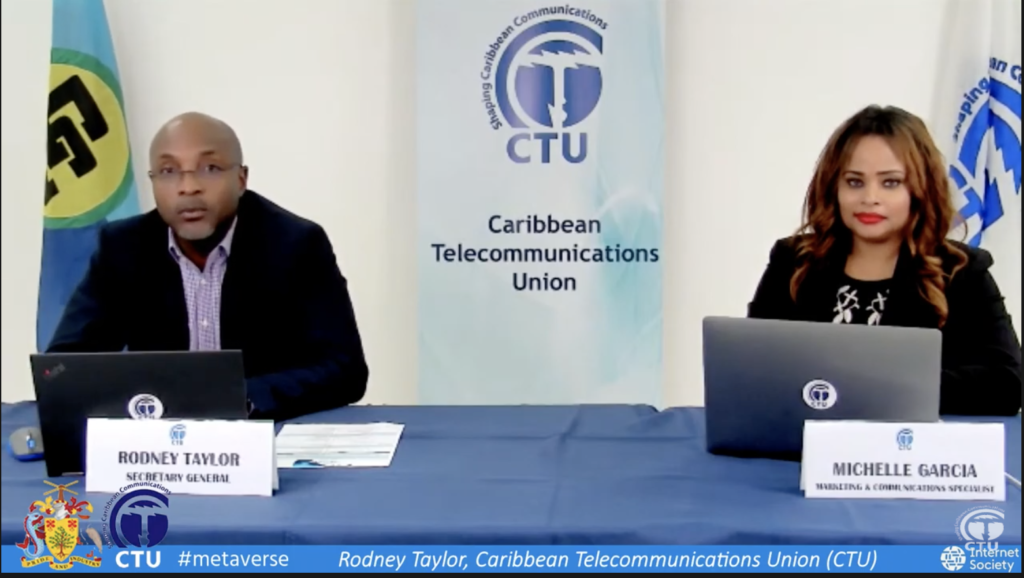Caribbean citizens have an exciting, new world to participate in – a new and emerging digital space, The Metaverse, offering wealth generating opportunities. This was among the main message shared at a webinar held on Monday 31st January 2022 and hosted by the Government of Barbados and the Caribbean Telecommunications Union (CTU), of which Barbados is one of 20 Member States.
Close to one thousand (1000) persons registered from across the region to participate in Traversing the Metaverse – A Caribbean Perspective to learn about the opportunities and risks associated with the emerging digital platform. Setting the tone for the discussions, Mr. Rodney Taylor, CTU Secretary General, said,
“One thing we must never do in the region is to relinquish all technological innovation to the developed countries and simply be consumers of technology products and services residing in a distant cloud. We have too much regional talent for that to be the case. Yes, we must build global relationships and collaborate, but we must also take ownership for and be craftsmen and women of our destiny.”
Rodney Taylor, Secretary-General, Caribbean Telecommunications Union
This significant opportunity for Caribbean content creators was echoed by major players already operating in the digital space. Viewers heard from developers such as Mr. Hrish Lotlikan, the co-founder and CEO of SuperWorld and Mr. Sebastien Borget, the co-founder of SandBox. SandBox is a virtual space where players build, own and monetise their gaming experiences using tradable non-fungible tokens (NFTs). SuperWorld is a metaverse where users buy, sell and curate virtual real-estate, mapped from the physical surface of the Earth.
The metaverse described by Mr. Lotlikan and Mr. Borget is essentially a network of 3D interfaces, enabling individual connection and access to a parallel digital universe through an avatar, potentially enhancing the work, play, and education of the individual. And because participants are owners of the content they create, there exist exciting wealth generation possibilities. Importantly, both speakers emphasised that anyone can get involved in either metaverse spaces completely for free.
Members of CARICOM institutions, the Diplo Foundation, academia and regulators were among those sharing their expertise. Professor Avinash Persaud, Chairman, CARICOM Commission on the Economy, cautioned that “technology on its own does not improve the condition of humanity.” He said while technology is important for economic growth, data collected since the 1950s show that technology and technological change contributes a mere one to two percent growth per year. Noting, rather, technology and the computer revolution “have been associated with increasing inequality, changing levels of wealth from one sector to another, and a concentration of wealth” in the hands of a few. Explaining further he said, “while there has been the creation of Internet billionaires, there has been no concomitant lifting of others out of poverty.”
He advanced, “Society must therefore think about how it structures these initiatives for the benefit of all.” He highlighted that the Government of Barbados is exploring how the metaverse can be used to improve communication with citizens and residents of Barbados as well and at the same time is developing a single regulatory space with Kenya! Barbados is also providing opportunities for its citizens to be content creators for the digital space by providing them with the appropriate tools.
The Geneva, Switzerland-based Internet Platform Diplo’s expert, Vladimir Radunovic, lecturer in cybersecurity policy, Internet governance and e-diplomacy, pointed to a number of critical issues surrounding governance that must be addressed as the new digital space emerges. He said the metaverse is being built on existing technology, specifically the Internet, for which governments are still trying to come to grips with how to manage and regulate certain challenges, such as: harassment and cyber bullying.
He added, the metaverse brings new potentially risky issues to the fore like – deep fakes; harassment or violence against an avatar; terrorism, warfare and the application of international laws to the digital space; content policy control and unauthorised use of a person’s personal, biometric and location data, to list only a few. He indicated there are also safety, geopolitical and governance implications and that questions of the interplay of ethics, theology, and anthropology on the metaverse also arise. He recommended simultaneous drafting of digital policy while innovation takes place, and training programmes and digital-watch observatories should also be established.
Importantly, the virtual meeting also considered the skillsets necessary for Caribbean Citizens to actively participate in the digital space. Whilst they made clear that no one can accurately predict how the metaverse will evolve and what its attributes will be five years from today, presenters agreed that many opportunities exist for a variety of content creators in the sector. And, critically, an education system that supports the development of critical thinking and innovation built on traditional competencies was highlighted by Dr. Kim Mallalieu, UWI, St. Augustine as needed for the development of the sector.
To view the recording and learn more about the Metaverse, please visit the CTU’s YouTube channel https://www.youtube.com/user/TheCtunion/videos








